As bloggers, most of us have made the experience that sometimes writing comes easy, and then there are times when our creativity is dried up and words will not come when we need them most. Writer’s block can turn into a nightmare when you make a living from writing and you have to fight for every word.
Here’s what writer’s block is, the reasons for it, and how to cope with the blank page.
What is writer’s block?
Writer’s block describes a situation where a writer feels unable to create a written piece of content. It can be the failure to come up with ideas to write about or the inability to put thoughts into writing and create texts around your topic ideas.
(Almost) all writers experience writer’s block sooner or later. I certainly have had times when creating blog posts felt like an almost undoable task.
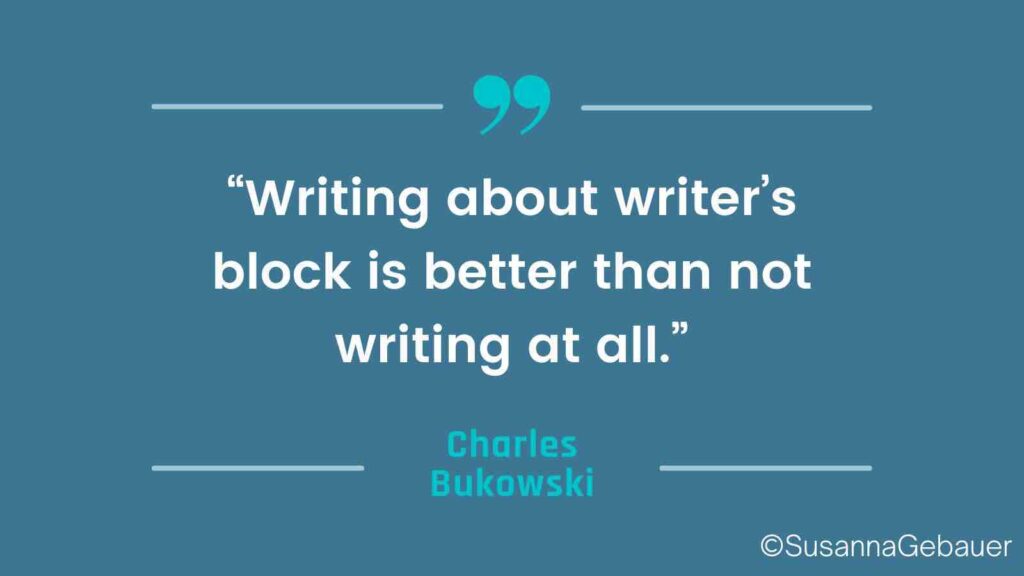
What causes writer’s block
The reasons for writer’s block are manifold. From not having enough writing experience to writing too much, the causes of writer’s block can come at every experience level and stage of the writing process from finding an idea to finishing up the piece of content and hitting the “publish” button.
Reasons for writer’s block:
You have written too much and run out of creativity.
There was a time when I wrote around 3 blog posts per week plus emails, lead magnets, social media posts, and an occasional guest post. Then came a time when I could not write one post per week. I simply could not write anything that lived up to my quality standards. I had written too much and forced myself to write too much. I was burned out of words.
Sooner or later we all face some form of writer’s block. But it helps, if we know more about content creation and have a clear process to follow. Check out this extensive guide to content creation!
You have too much on your mind.
I have a long list of todos – writing blog posts is just one part of my work. Sometimes I cannot make myself write quality blog posts because I get lost in too much other stuff. My mind wanders from one thing to the next. Instead of focusing on my writing, I tend to start solving several problems at the same time.
Worries and unhappiness do not help! They tend to make the problem bigger.
You fear you don’t have enough to say about a topic.
Yes, I am a victim of imposter syndrome. When I have an idea for a topic to cover, it can happen that I feel like all the other content out there is so great, do I really think I can provide something to the discussion? Fear or intimidation is never a great supporter of writing. The best writing comes from a point of confidence.
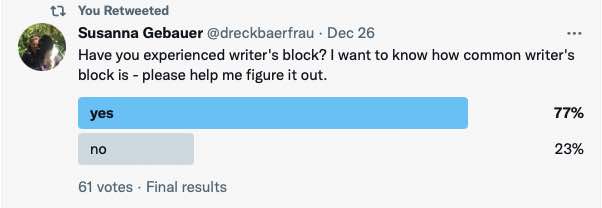
I do NOT believe that writer’s block comes from an unwillingness to work. If you simply don’t want to invest the work into your blog or blogging business, the problem is not writer’s block but rather laziness, or maybe blogging is just not your thing.
How to get rid of writer’s block
If writer’s block is something that will hit any content creator sooner or later, we should think about measures to take and how defeating writer’s block can become easier.
If you are looking for a cure for writer’s block, you have to consider both
- the symptoms of writer’s block that you are experiencing and how to deal with them
- general tactics to avoid writer’s block
Let’s start with defeating writer’s block one symptom at a time.
What if you are totally out of content ideas and cannot seem to find any?
Here are some tips to avoid coming into this situation in the first place – and some to find ideas when you are not exactly on a creativity streak:
- Be part of your niche. When you are active in your niche, reading, talking, and listening, you will automatically encounter ideas. Questions, topics, and news will inevitably cross your path.
- Talk to people from your niche. Listen close. Almost any conversation around topics from your niche can provide you with new ideas and open your eyes to new angles.
- Read blogs from your niche. Regularly. Get inspiration for new content ideas from other peoples’ content. Sometimes headlines are enough, sometimes a great topic that has not been covered as well as you would like, or content that is missing valid points – all of these can make great topics.
- Browse social media. What are people tweeting about? What comes up in your Pinterest feed? Check Facebook groups from your niche. A Twitter thread you discovered? Social media is where I find an endless stream of content ideas.
- Keep a list of topic ideas. Whenever you have an idea, write it down. When you are out of ideas the list will save you from writer’s block.
- Update an old post. If you cannot find the drive to cover a topic from your list, consider turning an old blog post into fresh content.
How to deal with the blank page.
Break up the content you want to write into smaller parts. Start with an outline or some subsections you want to cover or make a list of items you want to cover. Don’t stick to the start-in-the-beginning approach if you find it hard to start. If there is one section or list item that you find easier to write about, why not start there?
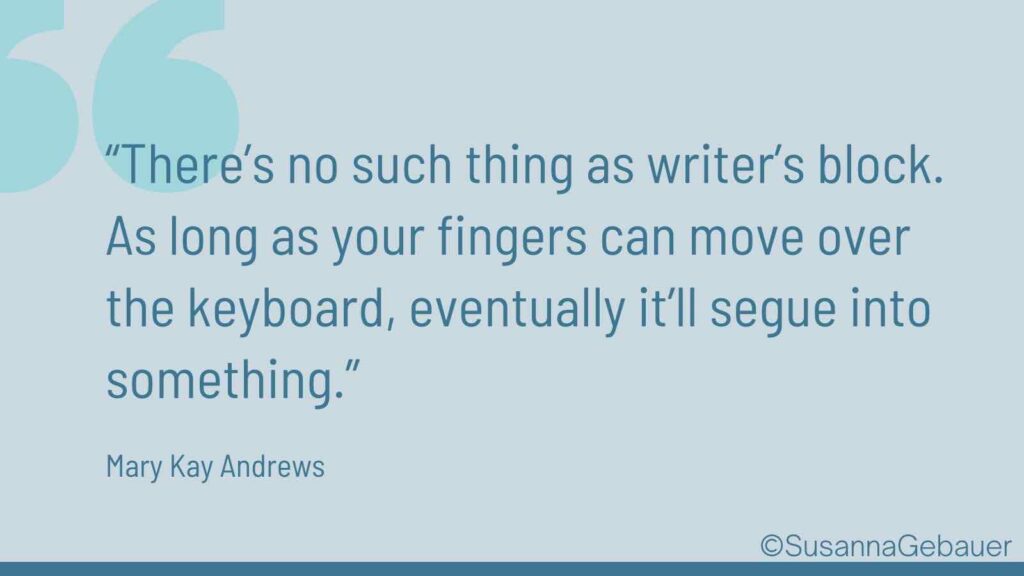
The worst thing you can do is wait for inspiration to come back and NOT write. Write something, it does not have to be perfect. It does not even have to end up in your final piece of content. Just write and fill the blank page.
The fear of not being good enough.
Keep in mind that your first draft does not need to be the final version. Write a draft today, and let it lie for 24 hours. Reread what you have already written. Now decide, which parts you like, which ones you want to rework and improve, and what is missing to make your content even better.
Taking a step back and revisiting your content can help you find the flaws or take an unprejudiced point of view.
A reread a couple of days later will give you an idea if you like your content or if you think you still need to improve it.
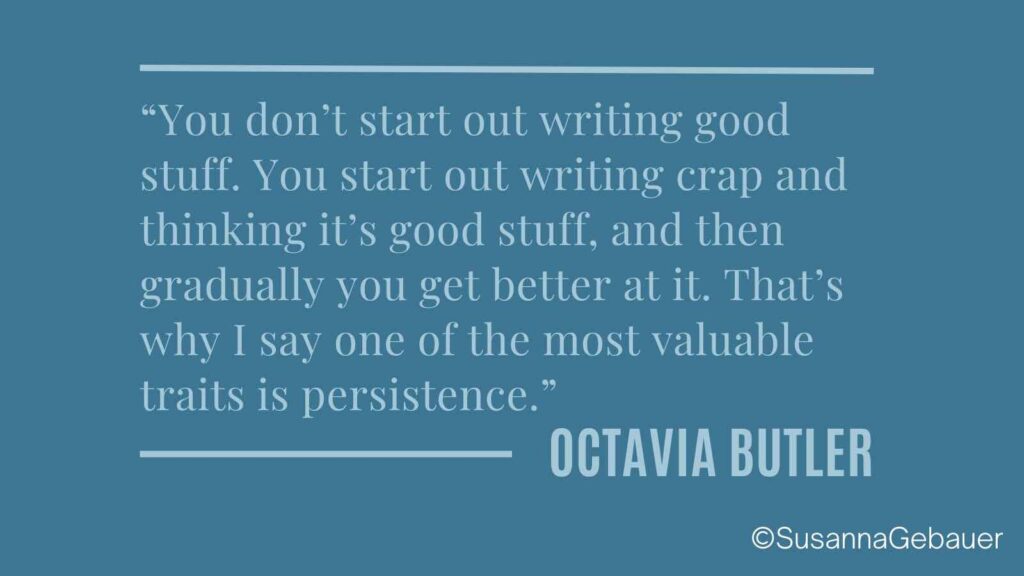
Distractions.
If you easily get distracted, try to change external factors. What works for you may be different from what works for me. Change the time of day you write. Change the location. Try to have background music or switch off the music. Switch off your phone or email notifications. You can also try to write in smaller time slots. Concentrate for 15mins. Then do something else. Write for another 15mins. Set the alarm.
Write at a different time of day. Maybe you are more creative in the morning but usually write at 4 pm in the afternoon? Try a different schedule.
Finding a solution for you may involve some trial and error. Just dare to try a new setting if your traditional setting does not work for you anymore.
What if you are out of creativity? Just burned out?
Allow breaks. I know it’s hard but breaks are essential. Don’t wait until you are out of creativity, it may be too late… Take your dog for a walk, or go for a run. Meet a friend for coffee. Overfocus may result in writer’s block.
Don’t let the break become an excuse to procrastinate.
Do something else. Don’t sit in front of a blank page and hope for creativity to set in. If you cannot write now, you can create fun social media posts, a new bonus offer, or a presentation. Working on something new can boost creativity. You may even find a new story to write about!
Ask your social media audience (or another community) what they would love to have covered in a post. Get inspiration from there.
Talk instead of write – wait what? Wasn’t this all about Writer’s block? Sure it still is. But if writing is not working, you can try talking about a topic. Just imagine someone listening and telling them about it. Now, start writing down what you told.
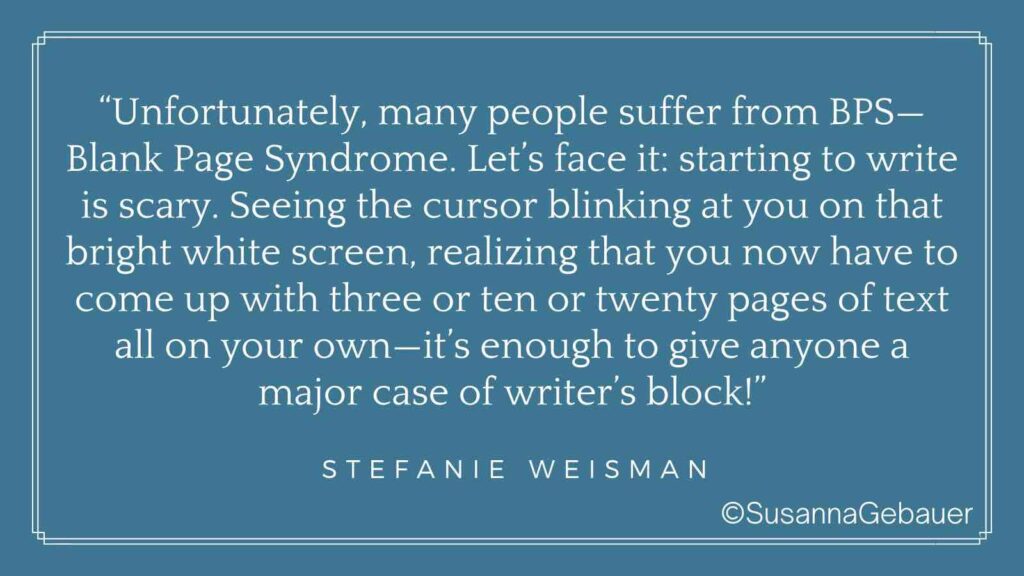
Artificial Intelligence
My perception of AI writing is a little ambivalent. I have seen too many generic texts obviously created with the help of AI. For instance, multiple people on social media use the same hook that was clearly generated by an AI tool.
That is not what I want to see in a blog post and AI content will never convey your personality that will make your content and blog stand out. That is why I strongly oppose using AI content on your blog. After all, your personality is a strong branding and community-building factor.
AI can still be a huge help with content creation!
If you are stuck with content creation, you may want to try starting with some AI content to fill your blank page or give you some ideas for the content. I do not recommend using the complete AI-generated content but why not use it as a starting point and then change, personalize and optimize from there?
How does it work? You put your keywords into the tool and get some suggestions for the content.
AI tools you can try are copy.ai or ChatGPT by openai.com.
What you can do to avoid writer’s block before you experience it
A writer does not want to experience writer’s block. There are some measures you can take to avoid getting into situations where writing seems (almost) impossible. These methods start long before you sit down to create a piece of content. Many of them consider your well-being more than the writing process.
Great and easy writing comes from a place of confidence, satisfaction, and feeling good. Look after yourself and your mind and your writing will come easier.
Take breaks
You are not a machine – your mind and creativity aren’t either. Entrepreneurs have a tendency to over-focus. Keep that in mind and “schedule” time off.
- Go for a run or take the dog for a walk.
- Meet friends and talk about different things, not your blog or business.
- Treat yourself to something nice. Go to the movies, have a massage, play a game – whatever you love, do it.
- Read a book – not something work-related but just for fun.
- Drink coffee, tea, or hot chocolate.
- Read other blogs for inspiration
Find a setting that works for you
A routine also helps to make creativity and writing easier:
- Eliminate distractions
- Switch on or off some background music
- Brainstorm ideas in subsections or bullet points
- Start with some words – they can be in the middle of your future piece of content
- Write a fun piece instead
Don’t put off writing just because it does not feel as easy as you are used to. Start!
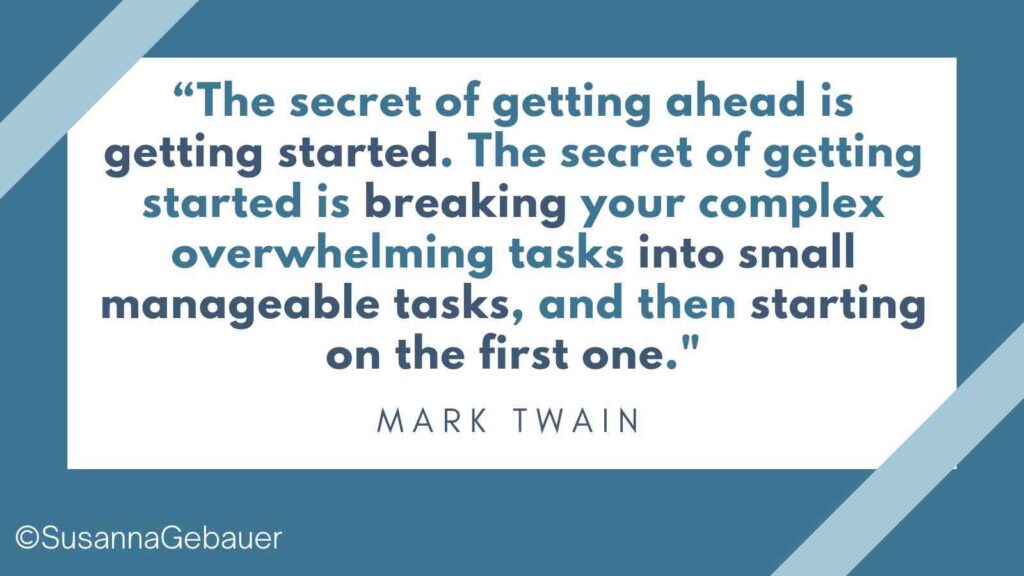
The worst thing you can do to conquer writer’s block is to sit back and wait for it to go away. The feeling of not being able to write may never go away if you don’t start writing again. It may feel hard but you have to work your way through it.
Even if you just do some keyword research or blog post structure today. Get started!

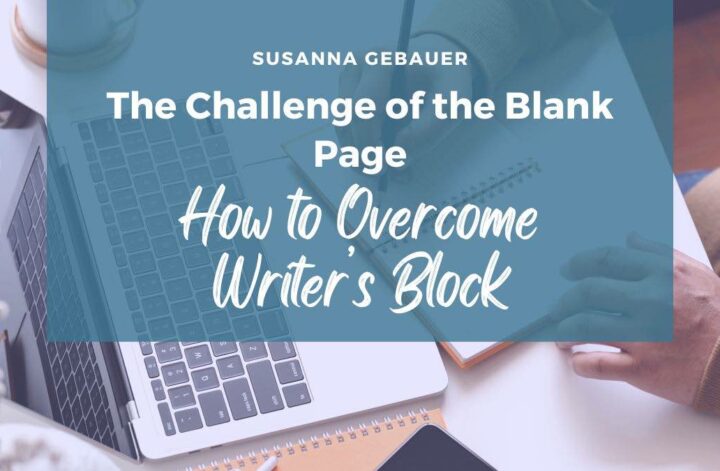



3 Comments
Dear Susanna,
I just stumbled upon your blog post on overcoming writer’s block and I have to say, it’s an absolute gem! Your practical tips and insightful advice really resonated with me, and I can’t wait to apply them to my own writing process. Your writing style is so engaging and relatable, making it a joy to read every word you’ve penned. Thank you for sharing your wisdom and expertise with us aspiring writers. Your blog is truly a treasure trove of inspiration!
Warm regards,
CGPTOnline
Thank you – and welcome to my blog.
I am glad you like my post and writing style 🙂
Susanna
Great post, Susanna! I’ve been struggling with writer’s block for a while now and your tips have given me a fresh perspective. I particularly liked the idea of freewriting and allowing myself to write without worrying about perfection. Breaking down the writing process into smaller, manageable steps is also something I’ll definitely try. Thank you for sharing your insights and practical advice on overcoming writer’s block. Your website is a fantastic resource for writers like me who are looking for inspiration. Keep up the great work! – Jon Robertson.
P.S. If you’re interested, you can check out my website at https://gptnederlands.nl/.